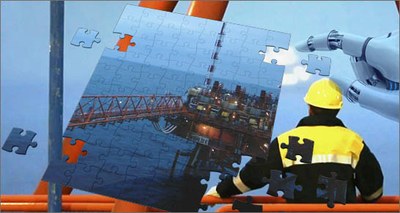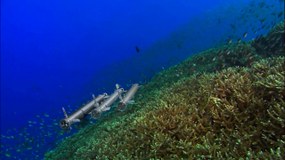Energy: Italian-led consortium wins ESA tender for reconversion of offshore oil and gas platforms
16/9/2021
Partners include ENEA, Eni, TIM, SRS, METAPROJECTS, IRSPS and NEXT Systems Engineering
 An Italian-led consortium comprising ENEA as coordinator, Eni, METAPROJECTS, IRSPS, NEXT Systems Engineering, SRS Research and Development Services and Tim won a tender from the European Space Agency (ESA) for safely dismantling oil and natural gas platforms and marine wind farms at their end of life and evaluating possible 'second life' solutions. The project, called INSURE (INnovation in SUstainable offshoRe dEcommissioning), aims to use innovative technologies, drones, sensors, IoT systems and artificial intelligence as part of ARTES 4.0, ESA’s program [1] to explore new possible uses of their satellite technologies.
An Italian-led consortium comprising ENEA as coordinator, Eni, METAPROJECTS, IRSPS, NEXT Systems Engineering, SRS Research and Development Services and Tim won a tender from the European Space Agency (ESA) for safely dismantling oil and natural gas platforms and marine wind farms at their end of life and evaluating possible 'second life' solutions. The project, called INSURE (INnovation in SUstainable offshoRe dEcommissioning), aims to use innovative technologies, drones, sensors, IoT systems and artificial intelligence as part of ARTES 4.0, ESA’s program [1] to explore new possible uses of their satellite technologies.
INSURE has two phases: the first one targeted at conducting a technical and economic feasibility study and collecting extensive data using sensors, engineering services, logistics, laser monitoring technologies and robotics. The second phase is demonstrative and foresees further study of possible solutions, like the use of exhausted wells as carbon dioxide storage sites, the use of platforms to produce solar or wind energy - converting the surplus of energy produced into green oxygen and hydrogen - but also for tourism purposes or as an 'educational gym' for students in the field of meteorology, wave dynamics and environmental and biological studies.
"The recent allocation of 70 millions of the PNRR Complementary Fund to the recovery of platforms in the Adriatic off the coast of Ravenna is evidence of the interest in developing the activities in this sector", Antonio Palucci, head of the ENEA Laboratory of Diagnostics and Metrology, pointed out . "Although the project is still in its infancy - he said - it has already attracted the attention of many professional and institutional end-users interested in implementing new technologies for environmental monitoring and in opportunities for redevelopment and conversion of obsolete structures for tourism or green energy production ".
In particular, ENEA will make available its know-how and technologies, with particular reference to laser sensors mounted on underwater drones for 3D underwater viewing and environmental monitoring of any discharge of pollutants. The drones, capable of operating also in swarm mode and communicating with each other and the satellites, will also be used to assess the condition of the platform structures. The information will be reprocessed and returned in a virtual and augmented reality environment for the project partners.


Eni will be responsible for supporting activities related to decommissioning, that is the final phase of the life cycle of the assets belonging to the Oil & Gas supply chain and, in general, industrial plants. A fundamental activity in the investment process, which has important economic, social and environmental implications in the context in which it is conducted. Full compliance with the principles of sustainability in this phase of the activities is consistent with the corporate mission that adheres to the United Nations Sustainable Development Goals.
The conversion of unprofitable or discontinued assets, which are given a new life and a sustainable and low-carbon future, is part of Eni's strategy, together with the search for innovative solutions, processes and products aimed at the reuse and enhancement of waste materials to make the economic system more efficient, while minimizing both resources and energy consumption. Decommissioning is an opportunity both in terms of employment and regeneration of raw materials and assets which, at the end of the industrial life cycle for which they were designed, still have the potential to be reconverted and reused.
TIM, jointly with Olivetti, will create a digital farm for the Group's IoT, a digital 'Business Intelligence' platform performing real-time monitoring of the activities envisaged in the decommissioning plan. This innovative solution allows to improve safety parameters and generate cost benefits. In particular, thanks to the adoption of Artificial Intelligence and sensors installed on offshore platforms, combined with 5G, signals for Narrowband-IoT communications and satellite communication systems, the data collected will be sent to the control center and processed in real time, making it possible to report possible maintenance requests.
METAPROJECTS, a private research institution already collaborating with ENEA at the Brasimone Research Center (Bologna) in the EXADRONE project, for the development of sensor equipped drones for environmental control, will take part in the construction of drones and integrate ENEA technologies, dealing with the hardware, firmware and software design of autonomous flying systems.
NEXT Systems Engineering SpA will study the aspects relating to SW support solutions for the automatic management of positioning data, targeted at decommissioning activities. It will also analyze the issues pertaining to the definition of UAV flight plans in support of logistics and safety of operations thanks to the implementation of virtual / augmented reality with the support of the consortium partners. The "heart" of the system, being developed by NEXT Systems Engineering, will be the Fleet Management Tool capable of receiving real-time information from sensors installed on autonomous aerial platforms, boats, submarine vehicles and satellite systems like the Global Navigation Satellite Systems (GNSS), Satellite communications (SatCom) and Earth observation (EO) of the system Coperncus.
The International Research School of Planetary Science (IRSPS) of the University of Chieti-Pescara will make available its skills for the analysis of geological and environmental system requirements, to define the guidelines for dismantling and reusing offshore platforms, using terrestrial and satellite technologies. The IRSPS, a spin-off of the University, is acquiring an off-shore platform in the Adriatic, no longer operational, to be used to carry out realistic end-to-end tests of decommissioning processes and to explore the feasibility of reuse of platforms as an "educational gym" for university students and for research, both in the field of meteorology and wave dynamics and in environmental and biological studies.
The S.R.S. Research and Development Services has considerable expertise in planning dismantling activities of industrial plants and the related "Waste Management" activities. The experience gained, in particular, in the nuclear decommissioning sector has led it to specialize in the dismantling sector, particularly in the selection of cutting and dismantling techniques, definition of intervention procedures, confinement of work areas, minimization of secondary waste, traceability of materials, identification of methods of treatment of waste materials, management of waste materials. In INSURE it will deal specifically with these non-secondary logistical aspects.
[1] The program Artes 4.0 (Advanced Research in Telecommunications Systems) was launched by the ESA to support the competitiveness of European and Canadian industry on world markets.
